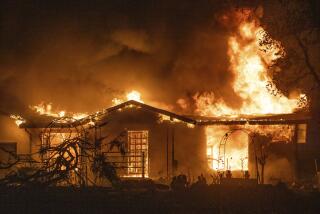Subsidizing Smokers--Something to Burn Over
- Share via
Newspapers are full, lately, of stories about tobacco companies. Daily we read reports of the latest offer or counteroffer in the war of megamergers. Like devotees of a soap opera, we wonder each day: Will management save RJR Nabisco? Are there any food companies left for Philip Morris to buy? We watch these goings-on with mild fascination, as if they had little to do with our everyday lives.
In fact, “tobacco economics” have a lot to do with us, wholly apart from their machinations on Wall Street. They touch the pocketbook of every person who has ever bought health insurance, car insurance or life insurance. Of every person who has ever stayed in a hotel. Of every person who has decided not to smoke.
To understand why, you have to examine the source: cigarettes. Reduced to the most basic level, cigarettes have two components--smoke and fire. In enclosed environments smoke and fire damage both people and property, and somebody’s got to pay the repair bills.
Consider hotel rooms. Despite smokers’ best efforts, cigarettes burn holes in carpets, bedding and furniture, cause yellowing of walls and surfaces, and leave unpleasant odors in rooms. These effects are costly to repair.
Recently every major hotel chain has inaugurated nonsmoking rooms. These rooms are popular. Most hotels report that they have a consistently higher occupancy rate than regular rooms. Not surprisingly, these rooms also cost $1,000 to $1,500 less per year to maintain. How many hotels are passing this cost saving on to customers? One, the Nonsmokers Inn in Dallas. In other hotels, nonsmokers subsidize smoking patrons.
Consider auto insurance. Studies by Farmers Insurance Co. and Columbia University show that smokers have almost twice the auto accident rate of nonsmokers. There are a number of possible reasons: Smokers may be distracted by the smoking ritual; they may be higher users of other addictive substances that could lead to accidents, or the higher level of carbon monoxide in an enclosed space may impair reaction time.
Whatever the reason, nonsmokers are a better insurance risk than smokers: They cost less to serve. How many insurance companies pass the savings on to customers? Only one. Farmers offers a nonsmoker’s discount in the 22 states that it serves. Interestingly, even with the discount, nonsmokers’ auto insurance is one of its most profitable products. If Farmers is profitable even with a discount, don’t nonsmokers deserve similar discounts from other companies? As it is, their nonsmoking policyholders subsidize the coverage of smokers.
If you are a nonsmoker and do not have a substantial discount on your health insurance, you are also paying too much. Studies show that nonsmokers submit fewer health-insurance claims, and the nature of their claims is generally less serious and less costly. Have insurance companies passed their savings on to their nonsmoking customers? Only minimally. Percentages vary, but most companies offer nonsmoking individuals a 7% to 10% discount. Great, you say, until you hear that Blue Cross and Blue Shield of Minnesota offers nonsmokers a discount of 22%--more than double the national average. Like Farmers, the company’s nonsmoker’s insurance is one of its most profitable lines. If Blue Cross and Blue Shield makes a profit with a 22% discount, why don’t other insurance companies increase their discount to nonsmokers? Once the smoke clears, you can see the answer: Their nonsmoking customers subsidize the coverage of smokers.
Finally, there is life insurance. Every life-insurance company in the country offers discounts to nonsmokers. This is no surprise. Industry studies show that, on the average, smokers die seven years earlier than nonsmokers do. Clearly the nonsmokers are a better risk. What is surprising is that two of those companies--CNA and Franklin Life--are owned by the same companies that own Lorillard and the American Tobacco Co., the manufacturers of Newport and Lucky Strike cigarettes. As one economist observed, “Not only do they kill you . . . they bet that you’re going to die.”
The smoke-and-mirrors game in which nonsmokers subsidize the increased costs of smokers has gone on for too long, and it penetrates too many areas of our lives. Let’s use the occasion of today’s “Great American Smoke-Out” to smoke out tobacco economics, and return fiscal and respiratory control to the two-thirds of Americans who don’t smoke.
More to Read
Inside the business of entertainment
The Wide Shot brings you news, analysis and insights on everything from streaming wars to production — and what it all means for the future.
You may occasionally receive promotional content from the Los Angeles Times.










